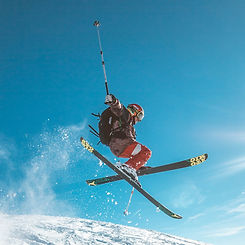A Modern Brain-Based Approach
Train your mind like you tran your body! Mental performance is just as essential as physical training for success in sports. Whether you’re aiming to improve focus, manage pressure, or recover from setbacks, I offer personalized neurofeedback and performance coaching to support your growth. With the right tools and guidance, you can build confidence, strengthen your mindset, and perform with greater consistency and control.

Neurofeedback Benefits
For Athletes
Brain Training For Athletes
Neurofeedback training helps improve focus and attention while reducing the impact of distracting thoughts. The Canadian freestyle skiing team, along with other Canadian Olympic teams, utilized neurofeedback training to enhance their performance in the 2010 Vancouver Olympics - winning more gold medals than previous years.
Reduced Head Noise
When someone is distracted or has trouble staying focused, intrusive thoughts interrupt attention and make it harder to perform well.
Sustained Focus & Concentration
Athletes depend on strong attention and the ability to stay focused under pressure. Neurofeedback helps train the brain to maintain concentration, reduce mental distractions, and improve overall cognitive control during performance. Neurofeedback helps improve focus, lessen stress, and anxiety when under pressure.

Brain Training For Athletes
Athletes depend on strong attention and the ability to stay focused under pressure. Neurofeedback helps train the brain to maintain concentration, reduce mental distractions, and improve overall cognitive control during performance. A 2018 UCLA study found that neurofeedback helped experienced golfers hit 12% more greens in regulation and reduced putts needed by 9.7% per round.
Brain Training For Athletes
Olympic shooters use neurofeedback training to enhance reaction time. Shooters demonstrated faster responses and greater accuracy in their performance.
Improved
Reaction Time
In sports, most performance situations depend on reaction time - the ability to detect, process, and respond to a stimulus. It is how quickly an athlete can perceive an event and take action. Strong reaction time supports faster decision-making and more effective execution under pressure. Neurofeedback training has been shown to enhance brain function in ways that improve both visual and auditory reaction time.
Remain Calm Under Stress
Arousal refers to the level of activation, from a relaxed state to excitement. The right amount of arousal is essential for peak performance. Too much leads to anxiety or impulsiveness and too little leads to low energy. Neurofeedback helps regulate arousal levels. In high-pressure situations, it can reduce over-arousal and help athletes stay calm and in control.

Brain Training For Athletes
In a study involving female gymnasts on the balance beam, an independent judge evaluated gymnasts routines before and after neurofeedback training. The results showed measurable improvements in performance following neurofeedback training.

Neurofeedback Mirror
Just as you would quickly fix your appearance after noticing something in the mirror, neurofeedback allows the brain to “see” itself and begin to self-correct. It acts like a mirror for the brain, guiding it toward healthier and more balanced patterns.
Many clients begin to experience meaningful changes within 20 to 40 sessions. At the beginning of each session, we review your progress, and the training is adjusted to support your goals.
For years, neurofeedback has been used by high-level performers, including Olympic athletes, the Red Bull Extreme Team, NASA, and the Armed Forces. It has helped them strengthen focus, build resilience, and reach their full potential. This same training is now available to anyone seeking significant improvements in performance.
FAQ's

Is it only for athletes with performance issues?
Not at all. Many athletes use this training to sharpen their edge, stay mentally consistent, and improve recovery. This approach is helpful for anyone who wants to improve focus, confidence, and mental resilience. Whether you’re a competitive athlete, returning to a sport you enjoy, or simply hoping to feel more steady under pressure, you are welcome.
What happens in a typical session?
In a typical session you will use neurofeedback training to sharpen your edge and perform your best. You’ll sit comfortably while sensors gently monitor brain activity. You can watch a movie or play a game while your brain learns to shift into a more focused, calm state.
How long does it take to see results?
Everyone responds differently, but many athletes begin to notice changes in focus, confidence, or stress levels within a few sessions. The effects tend to build over time with consistent training and support.

Neurofeedback Training for Athletes
HeartMath for Athletes
HeartMath is a science-based system that uses real-time biofeedback to help manage stress, improve focus, and build emotional resilience.
During sessions, you will learn practical techniques to bring your heart, mind, and body into alignment. These skills can be used before a game, during tough training, or in everyday situations that require calm and clarity.
Used in both mental health and performance settings, HeartMath gives athletes reliable tools to stay focused, balanced, and emotionally steady under pressure.
Connie Hurst
Mentoring with Keith Power and training as a provider in the KPA Elite Mental Training Program strengthened my ability to support athletes in developing strong mental skills for performance. My own background as a competitive athlete also guides and informs the work I do with each individual.

Have Questions or Ready to Begin?


